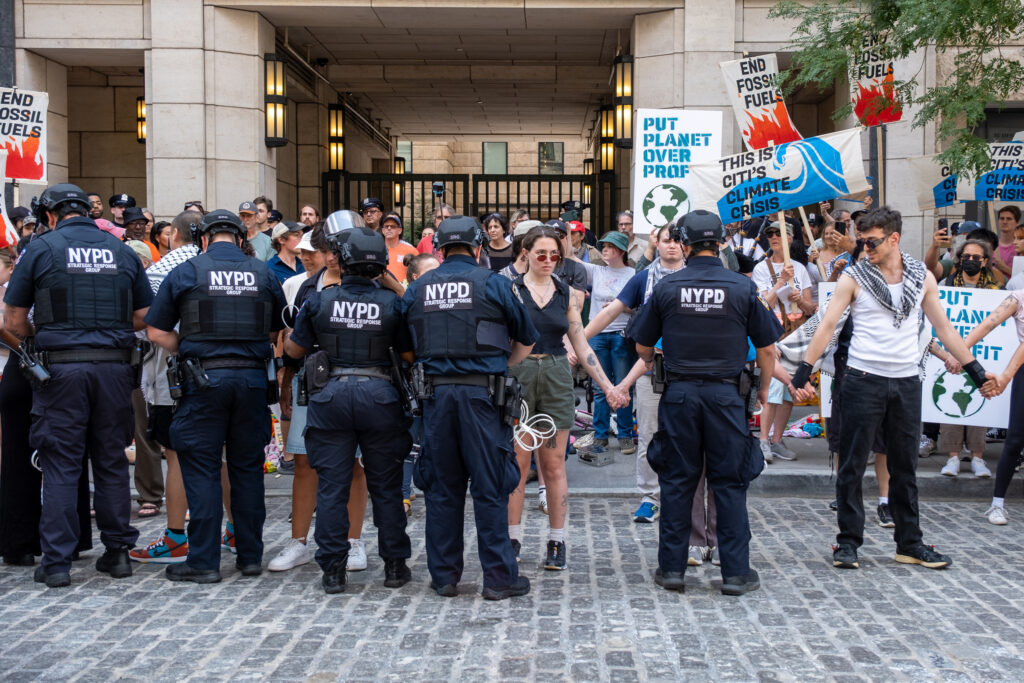On Thursday, 63-year-old John Mark Rozendaal, a grandfather, climate activist, and professional cellist, plans to defy a restraining order by performing Bach’s “Suites for Cello” in front of Citibank’s Manhattan headquarters. He calls the performance “a plea for our future.”
This action is part of the Summer of Heat on Wall Street, a civil disobedience campaign by climate activists opposing Citibank’s financing of companies involved in fossil fuel projects.
Activists claim that the bank’s security personnel and law enforcement are targeting the campaign’s leaders, citing multiple arrests and increasingly serious charges against founding members. Concerns have been raised about a potential pattern of intimidation and threats to freedom of speech.
Three weeks ago, Citi security worker James Flynn accused Rozendaal and Stop the Money Pipeline director Alec Connon of assault. The activists, who were using a PVC pipe to blockade the bank’s doors, deny any wrongdoing. A judge issued a restraining order for Flynn, a retired NYPD officer, against Connon and Rozendaal.
Connon stated, “No footage of this incident exists because it never happened.”
Citi, in a written statement, emphasized the right to protest but condemned actions like chaining to buildings or vandalism. The statement expressed appreciation for NYPD’s assistance in restoring access to their building.
NYPD Assistant Chief James McCarthy, overseeing numerous arrests at Citibank this year, denied any escalation in law enforcement’s response. McCarthy noted, “We arrest people, and nothing happens. It’s tiresome, but I don’t have any issues.”
The restraining order forbids Connon and Rozendaal from approaching Flynn’s person or associated locations for six months. Until their court date in September, the order stands.
Connon and Rozendaal risk criminal contempt charges, which could lead to severe penalties. Rozendaal, a pacifist and former Princeton University music professor, stated, “We’re going to Citibank to defy their intent to intimidate us.”
Jonathan Westin and Teddy Ogborn have also faced multiple arrests and serious charges, although the District Attorney’s office declined to prosecute. Connon suggested these actions might be a deliberate attempt by Citi to target visible organizers.
Joel Kupferman from the National Lawyers Guild cited a pattern of “increased harassment” from law enforcement against Summer of Heat demonstrators. Experts from the Center for International Environmental Law also voiced concerns, describing the restraining orders as an effort to suppress lawful demonstrations.
Connon believes the escalating charges indicate that the protests are making an impact. He urged activists to “crank up the pressure in the weeks ahead.”
Lead organizers have recently faced more serious charges, resulting in longer jail stays and potential lasting ramifications. Westin, arrested multiple times, refuted claims of resisting arrest or violent actions. Video evidence often exonerated him, leading to the DA’s office declining to prosecute.
The arrest of safety marshals like Westin, who liaise with police and ensure protest safety, raised particular concerns. Charles Slidders from the Center for International Environmental Law noted that the leadership of the protests seemed targeted to suppress free speech.
Ogborn was arrested despite attempting to leave the building as warned by NYPD. The DA’s office later declined to prosecute him as well.
Katie Redford from the Equation Campaign highlighted the implications of using police and legal systems against climate activists, emphasizing the need to protect democracy and the climate.
Lawyer Ron Kuby observed a pattern of unlawful arrests among climate activists, adding that the DA’s decisions not to prosecute often indicated baseless charges from the NYPD.
In an internal memo, Citi’s Ed Skyler acknowledged the protests’ disruptive nature but urged staff to avoid engaging with protesters. Incidents of aggression from frustrated Citi employees have been documented, further escalating tensions.
Despite meeting with Summer of Heat organizers, Citi executives have not agreed to the campaign’s demands, which include halting financing for fossil fuel projects and increasing support for renewable energy.
Globally, restrictions on protest rights are increasing. In the U.S., various states have passed laws limiting peaceful assembly. Internationally, environmental activists face severe crackdowns, as seen in Uganda, India, and the U.K.
Amnesty International recently declared its first prisoner of conscience in Canada, condemning the sentencing of Wet’suwet’en Chief Dsta’hyl for protesting against the Coastal GasLink pipeline.
Original Story at insideclimatenews.org
